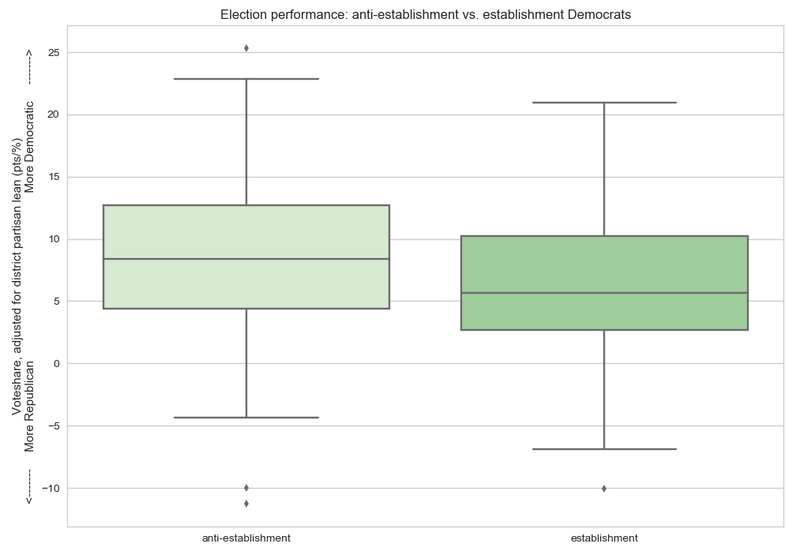2018 Midterms: Did anti-establishment Democrats perform better?
| Anti-establishment Democrats outperformed establishment Democrats by an average of 1.9 points relative to their districts’ partisan leans in the 2018 U.S. House general elections |  |
However…
-
The observed effect is relatively small at just 1.9 percentage points. 8.2 point overperformance for anti-establishment candidates (n = 60) compared to 6.3 point overperformance for establishment candidates (n = 149). Both groups significantly overperformed their districts’ partisan leans.
-
The effect is barely statistically significant (p = 0.049).
-
A lot depends on how one defines “anti-establishment”. Several fields in the dataset were used to categorize a candidate as “anti-establishment” or not:
Yeson any of the following fields indicated the candidate was anti-establishment:Warren Endorsed?,Sanders Endorsed?,Our Revolution Endorsed?,Justice Dems Endorsed?,PCCC Endorsed?,Indivisible Endorsed?,WFP Endorsed?Noon any of the following fields indicated the candidate was anti-establishment:Biden Endorsed?,No Labels Support?- The following fields were not considered indicative of establishment/anti-establishment status:
Party Support?- Political parties often throw their support behind viable candidates in competitive races (in general elections), even if the candidates don’t line up completely with the party establishment.Obama Alum?- Originally, I had thought that a candidate who previously worked in the former president’s administration couldn’t possibly be considered anti-establishment, but after some research, I concluded that having served in an administration does not mean one is ideologically aligned with said administration.
What if?
If Biden Endorsed? were ignored, and/or Party Support? and/or Obama Alum? were considered indicative of establishment status, the observed effect becomes even smaller (closer to 1 point) and the effect is no longer statistically significant. This illustrates that the effect is very small and highly dependent on how one categorizes a candidate as “establishment” or “anti-establishment”.
Notes
I used FiveThirtyEight’s dataset on 2018 Democratic primary candidates. This dataset includes only candidates who had primary challengers, so incumbent U.S. Representatives who did not face a primary challenge were excluded from this analysis.
Data Sources
2018 Midterms
2018 Midterms: Did anti-establishment candidates really perform better?
“The Year of the Woman”: Did candidate gender impact electoral performance?
2018 Midterms: Did candidates’ professional background, characteristics, and/or identities affect performance?
U.S. House: Do moderates come from swing districts? Relationship between caucus/coalition membership and district partisan lean
Last Updated: Feb 8, 2019